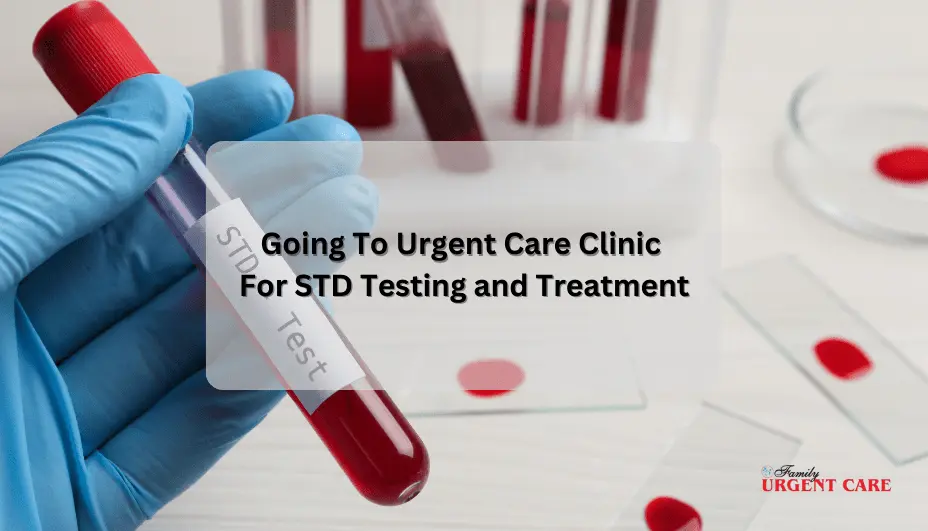According to US Department of Health and Human Services, there are more than 20 million new cases of STDs and STIs annually and these rates are bound to increase in the coming years if the patients do not seek timely care from healthcare professionals.
You might have seen people feeling confused and reluctant to reach out for help to healthcare facilities if they experience symptoms of STDs or STIs
If you seek help from a healthcare expert early, you can receive treatment at the right time and reduce the risk of complications in the future. And urgent care clinics are a better and quicker option to reach out when it comes to STD testing, diagnosis and treatment.
In this blog, we’ll clear your doubts regarding how urgent care can help you in diagnosing STDs or STIs. Further, you’ll also read about the diagnosis process and what can you expect about STD tests and screenings.
From understanding STD diagnosis and treatment in urgent care to answering all your frequently asked questions, we’ll leave no stone unturned. Let’s cut to the chase!
Does Urgent Care Do STD Screening and Testing?
Yes, you can get STD testing, diagnosis, treatment and even follow up care directly from urgent care centers without a referral from a primary care provider or other private facilities.
These clinics in your neighbourhood are highly equipped with experienced healthcare professionals who actively listen to your symptoms and provide proper treatment plans to recover from sexually transmitted diseases or infections.
If you compare urgent care facilities with hospitals or private facilities, they are comparatively cheaper and have flexible hours so that it is easier for you to visit the doctor as per your comfort zone. Also, urgent care clinics are open seven days a week.
If you can’t walk in to the clinic due to busy school, you can connect with your doctor online as some urgent care facilities offer telehealth services for STD or STI follow-up. During the online consultation, you can share any concerns or queries related to your current symptoms, medicines or complications, if any.
Remember! Early STI detection and treatment can significantly improve your sexual health, reduce infertility chances, and prevent further complications like pelvic inflammatory disease.
When Can You Visit Urgent Care For an STD Test?
Whenever you suspect any STD symptoms, such as unusual discharge from the vagina or penis, itchy genitals, blisters or sores, or a rash, you need to visit urgent care for STD screening and testing. Some other red flag signals to consult a healthcare professional are as follows:
- You feel pain during intercourse
- A foul smell from genitals after intercourse
- Painful or burning sensation during urination
- Unusual vaginal bleeding in women
- Pain or swelling in both or one testicle in men
- You may or may not have fever
- You might notice weight loss
However, not all STDs cause symptoms, so the Centers for Disease Control and Prevention (CDC) recommends all sexually active men and women go for STD testing at least once a year.
What Happens During an STD Test At Urgent Care?
Once you walk into an urgent care clinic for an STD consultation/testing, your healthcare provider takes a relevant medical history by listening to you, which includes asking about the concerning symptoms and current medications, if any.
Then, the doctor performs a physical exam, including a genital examination to check for rashes, blisters, ulcers, or discharge, if any. Depending on the type of suspected STD or STI, your doctor will order further tests that can be done easily in most urgent care facilities. Some of those STD tests include:
- Blood test: Your health provider might advise to draw blood samples to help him diagnose infections like herpes, syphilis, HIV or others. Not only does this test give accurate results, but it is also the most convenient and preferred test by healthcare providers as well as patients.
- Urinalysis: This test is primarily used to diagnose chlamydia, trichomonas and gonorrhea. Your doctor will ask you to provide a sterile sample of urine in the bottle designated for this purpose. The test will either be done in the urgent care clinic or sent to a lab testing facility.
- Swab test: In this test, your doctor or nurse takes a swab from the blister, sore or simply takes cell samples from the penis, vagina or cervix and sends it to the lab testing facility. It is commonly used to diagnose HPV (human papilloma virus), chlamydia and herpes.
- Lumbar puncture (Spinal tap): This is not a very common test, but sometimes your provider orders it to diagnose an advanced stage of syphilis or a herpes infection that has reached your brain or spinal cord.
- Oral test: Your doctor takes a swab from your mouth and sends the sample to the lab for testing for suspected STDs or STIs.
When Can You Get STD Results?
In urgent care settings, the time of STD results is variable depending upon the specific test and the number of tests done on you. Generally, most urgent care centers offer rapid testing for STDs like chlamydia and gonorrhea within a day or two.
However, discussing the expectations with the healthcare provider during your visit is essential. Additionally, you can also contact the urgent care clinic on the phone and inquire about your STD test results easily.
Once you have received your results, your healthcare provider in the urgent care clinic will make a personalized treatment plan and provide necessary health counseling to help you recover early from the disease.
How Can Family Urgent Care Help You Treat STDs or STIs?
There’s no need to feel embarrassed or hesitant to seek help for STDs or STIs at Family Urgent Care. Our experienced team is here to provide confidential and compassionate care you need as your health and well-being are our top priorities.
Here’s how family urgent care can help you relieve STD symptoms and improve your sexual health once you visit our urgent care facility:
- STD/STI Testing and Diagnosis: We have experienced healthcare providers (board-certified experts, nurse practitioners) who assess your condition, considering your current symptoms, medical history, and possible risk factors. Then, we conduct various tests, which include blood tests, urine tests and swabs to confirm STDs.
- Devise a Treatment Plan: After the diagnosis of STI or STD is confirmed, our providers prescribe appropriate antibiotics, antivirals and other adjuvant therapies to treat bacterial or viral sexually transmitted infections or diseases. They will also provide necessary counselling on medication usage, potential adverse effects, and precautions you can take to prevent further complications.
- Follow-Up Care: Our providers schedule follow-up appointments ,either physical or online, to monitor treatment progress, listen to any concerns or side effects, and conduct additional testing if necessary. You can also book a telehealth appointment for continuous care at Family Urgent Care.
- Give You Referrals: If you need specialized care or ongoing management for STD or STI at any stage of your treatment plan, our healthcare providers can refer you to specialists for further evaluation and treatment.
All in all, Family Urgent Care plays a vital role in the timely diagnosis, management, and prevention of STDs/STIs, promoting sexual health and well-being within the community.
FAQs:
Can you get insurance for STD testing at urgent care?
Yes! Most insurance plans include STD lab testing at healthcare facilities. However, you need to verify with your insurance company and the clinic as well about the acceptance of the insurance plan.
What is the process of STD testing and treatment at urgent care clinics?
The process for STD testing and treatment is very easy and reliable. An experienced healthcare provider listens to your symptoms, medical history and does a physical exam. Then a blood or urine sample is taken for further lab testing. After the lab results are obtained, your provider makes a treatment plan for you. And if needed, you can come to the clinic for follow-up care.
What are common types of STDs?
Human Papillomavirus (HPV) Infection is the most common STD in the US that causes irritation and discomfort around the genitals. Other common STDs include Chlamydia, Gonorrhea, Syphilis, Herpes, HIV and trichomoniasis which mostly occur in sexually active people.
Will I need to wait to get tested for STD at urgent care?
Yes, the average waiting time at an urgent care clinic is 15 to 30 minutes. But it depends on the number of patients and the complexity of each case.
What if I leave STDs untreated?
Untreated STDs can lead to serious complications like infertility, congenital birth defects in babies, and an increased risk of cancer, HIV and neurological manifestations, including loss of vision and hearing, difficulty walking and dementia. Although some STDs might be asymptomatic, they can still cause fatal infections in your body.
What can increase the risk of getting STDs?
Some of the main factors that can increase your risk of getting sexually transmitted diseases are having multiple sexual partners and having unprotected sex. Other risk factors include not having HPV or Hepatitis A or B vaccine and having a weak immune system.
How can you prevent STDs or STIs?
You can prevent STDs or STIs by taking some proactive steps, such as practicing abstinence and getting yourself vaccinated against STDs or STIs like HPV and Hepatitis B. For sexually active people, doctors recommend using appropriate condoms during sexual intercourse. Also, the main precaution to prevent STDs is open communication about sexual health and limiting sexual partners. Also, avoid sharing needles and do regular health check ups to ensure early detection, diagnosis, treatment and follow up care.
| You can book your appointment for an STD or STIs consultation at Family Urgent Care right away. We also offer follow up appointments via telehealth so you do not need to visit us in-person if you have busy schedule. |

